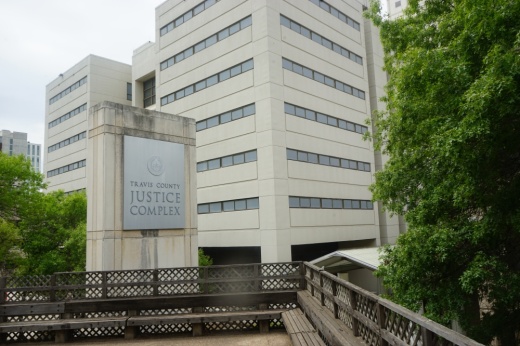The lawsuit—filed April 10 by the American Civil Liberties Union and New York-based law firm Weil, Gotshal & Manges LLP—addresses the lack of legal counsel for low-income arrestees during magistration, or an arrestee's first appearance in front of a judge during which bail and release conditions are set.
It argues that arrestees without a lawyer are left to defend themselves and vet questions about their alleged crime and details about their relationship with witnesses. ACLU officials said these questions could elicit answers that jeopardize the arrestee's case.
Individuals who do not receive counsel at first appearance, or CAFA, are more likely to receive a pretrial detention order, triggering a domino effect leading to increased jail time, and higher rates of guilty pleas and criminal convictions, according to the ACLU.
“Right now in downtown Austin, people are being forced to participate in criminal court hearings from jail without an attorney there to protect their rights,” said Savannah Kumar, staff attorney at the ACLU of Texas, in a news release. “This situation is urgent. Every day that passes without counsel in place at these initial criminal hearings is a day that people are being denied their constitutional right to counsel, all while being separated from their loved ones, home, and livelihood.”
The details
The plaintiff listed in the lawsuit is Skylor Johnson, who is in his mid-30s and is experiencing homelessness. Johnson was arrested and booked into Travis County Jail April 9. He requested a court-appointed lawyer but was not provided one for at least a day after his arrest, according to the ACLU. As of April 11 he remained in custody under a pretrial detention that was issued against him during his first court appearance in which he did not have counsel, according to the ACLU.
Johnson seeks to represent others who were denied counsel at first appearance when booked in Travis County Jail, according to the ACLU.
The context
Travis County officials have been trying to establish a counsel at first appearance program for years. The Travis County Commissioners Court first launched a CAFA pilot program in April 2022 after months of preparation, only for it to be paused 13 days later due to staffing shortages and space issues at the jail.
Travis County Sheriff’s Office employees said staffing shortages made the program difficult and stressful to run. Five employees quit in the less than two-week span of the program.
The county later outlined steps to reinstate CAFA, which included renovating an empty room in the jail where the program could run and filling vacancies at the sheriff’s office.
However, two years after the program initially launched, the county does not have a timeline for when the renovated room will be finished and TCSO still has a 27% vacancy rate as of April 1.
Diving in deeper
The ACLU and 36 other activist groups sent a letter March 20 to county leaders, urging them to take meaningful action in establishing a CAFA program. The letter called Travis County’s initial bail hearing process a “crisis that warrants immediate action.”
Travis County Judge Andy Brown suggested implementing a virtual CAFA program as a temporary fix at a March 21 Commissioners Court meeting; however, the Public Defender’s Office and the Capital Area Private Defender’s Office—the county’s indigent defense groups—have maintained that virtual magistration is ineffective and does not provide the same outcomes as in-person counsel.
What they’re saying
More than a dozen community members, activists and county employees urged the Commissioners Court to make CAFA a top priority at the March 21 meeting.
“You could save so much money. You could do all of that advocacy in 15 minutes, but instead it takes us hours,” Cassandra Champion, an attorney with the Public Defender’s Office, said. “It is the most time consuming part of my job many days. We’ve been told there aren’t resources for CAFA, but you’re using your resources in many ways that are very inefficient.”
Several members of immigrant-rights group Austin Sanctuary Network also argued that implementing CAFA is essential in light of Senate Bill 4. If approved, the bill would give state and local police the power to arrest migrants suspected of illegally crossing the Texas-Mexico border.
“CAFA would be the first and potentially only line of defense against things like police stops of people based on racial profiling or other problematic stops under SB4,” said Arielle Lewis-Zavala, an investigations supervisor at Travis County’s Public Defender’s Office. “I’ve seen a lot of confusion and fear in the community under SB4, and it's really terrifying thinking of the people potentially facing the consequences of SB4, being ensnared in the system, without access to CAFA.”
What’s next
Travis County will pilot CAFA again on April 23, 25 and four days in May in the auxiliary courtroom next door to the jail.
Trisha Trigilio, a senior staff attorney at the ACLU Criminal Law Reform Project, called the pilot shifts “a sluggish response that follows two years of excuses and delays.” The pilots are expected to help less than 1% of the people arrested in Travis County Jail annually, according to the ACLU.
In a statement, county officials said they are committing to implementing CAFA as soon as feasible.
“Travis County is committed to improving access to justice for all people who move through our criminal legal system, including providing counsel at first appearance,” said Hector Nieto, spokesperson for Travis County. “By implementing CAFA, we can help make our community safer and more resilient by stabilizing families and reducing the amount of time a person spends in jail after an arrest and while awaiting a trial.”
If the ACLU wins the lawsuit, Travis County will be constitutionally obligated to provide counsel at first appearance to all arrestees. The ACLU has secured CAFA in two prior cases in Galveston County, Texas, and Alamance County, North Carolina.





